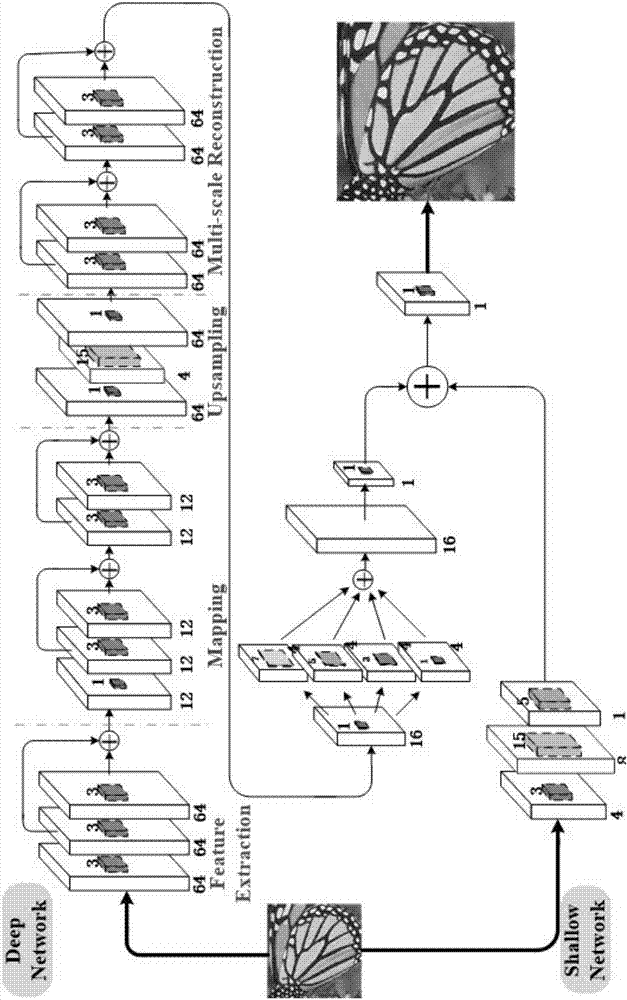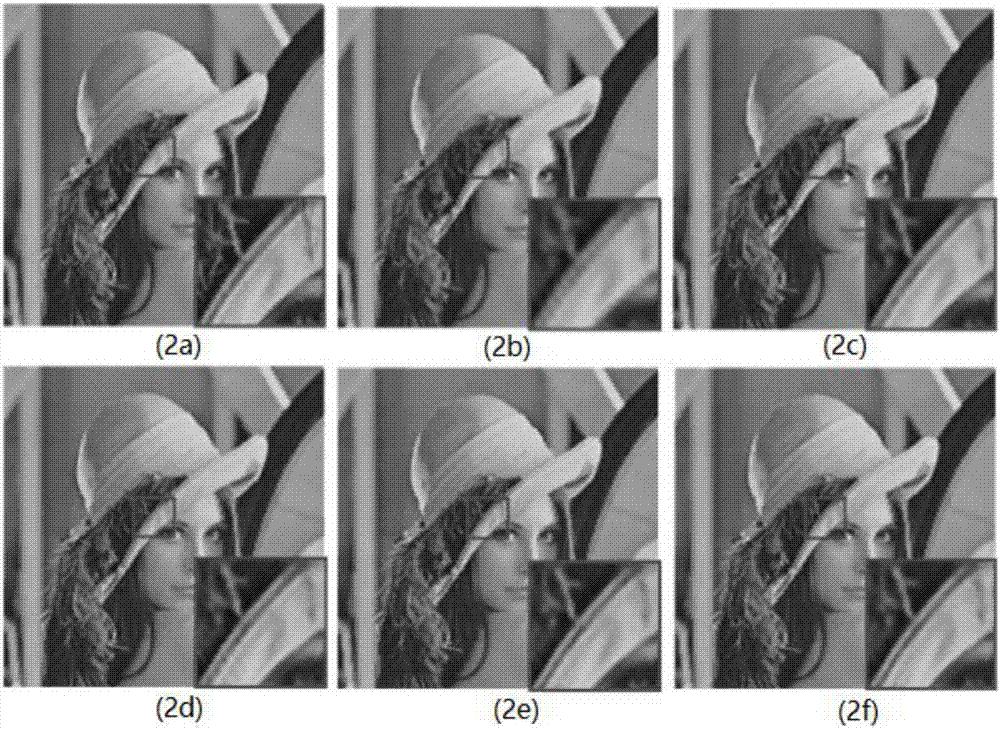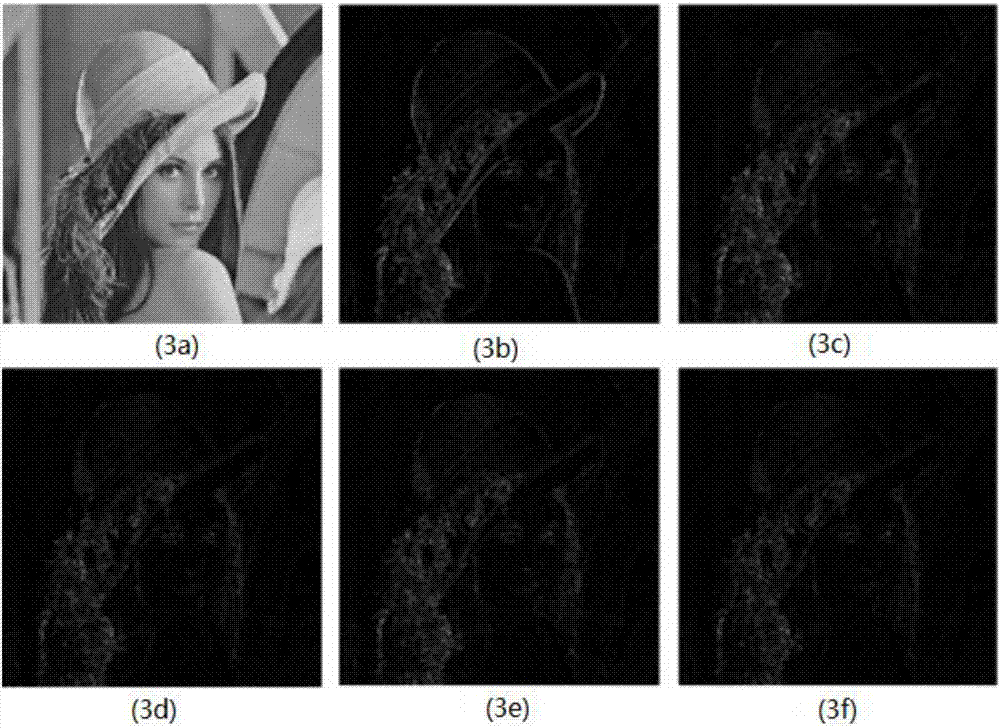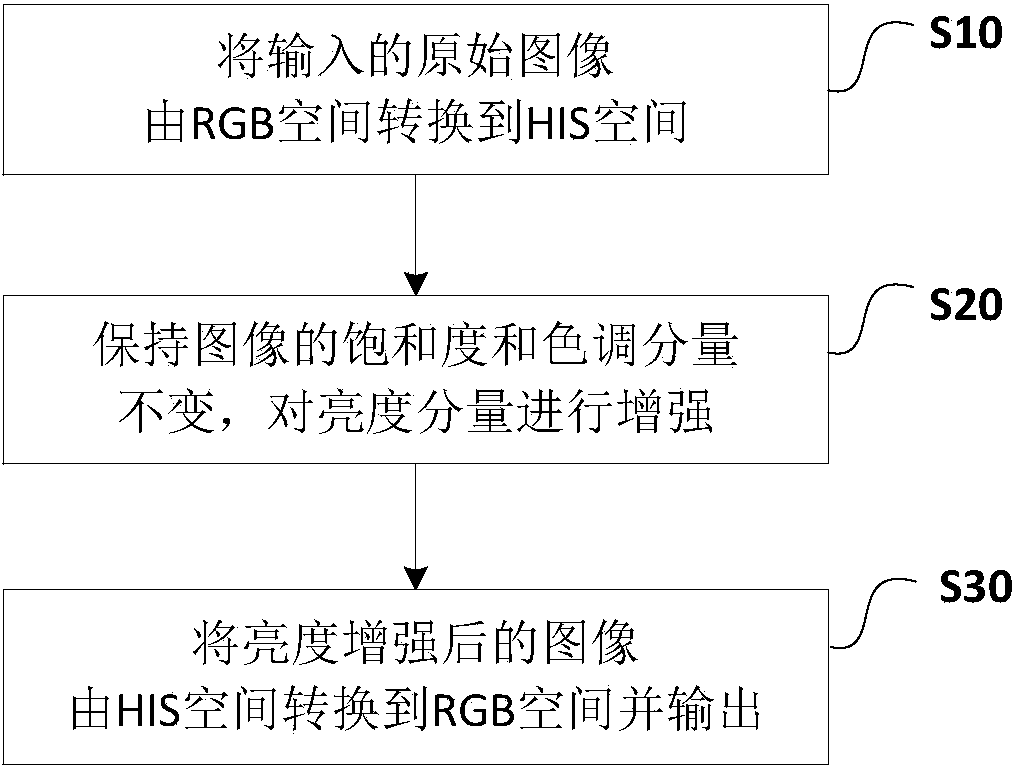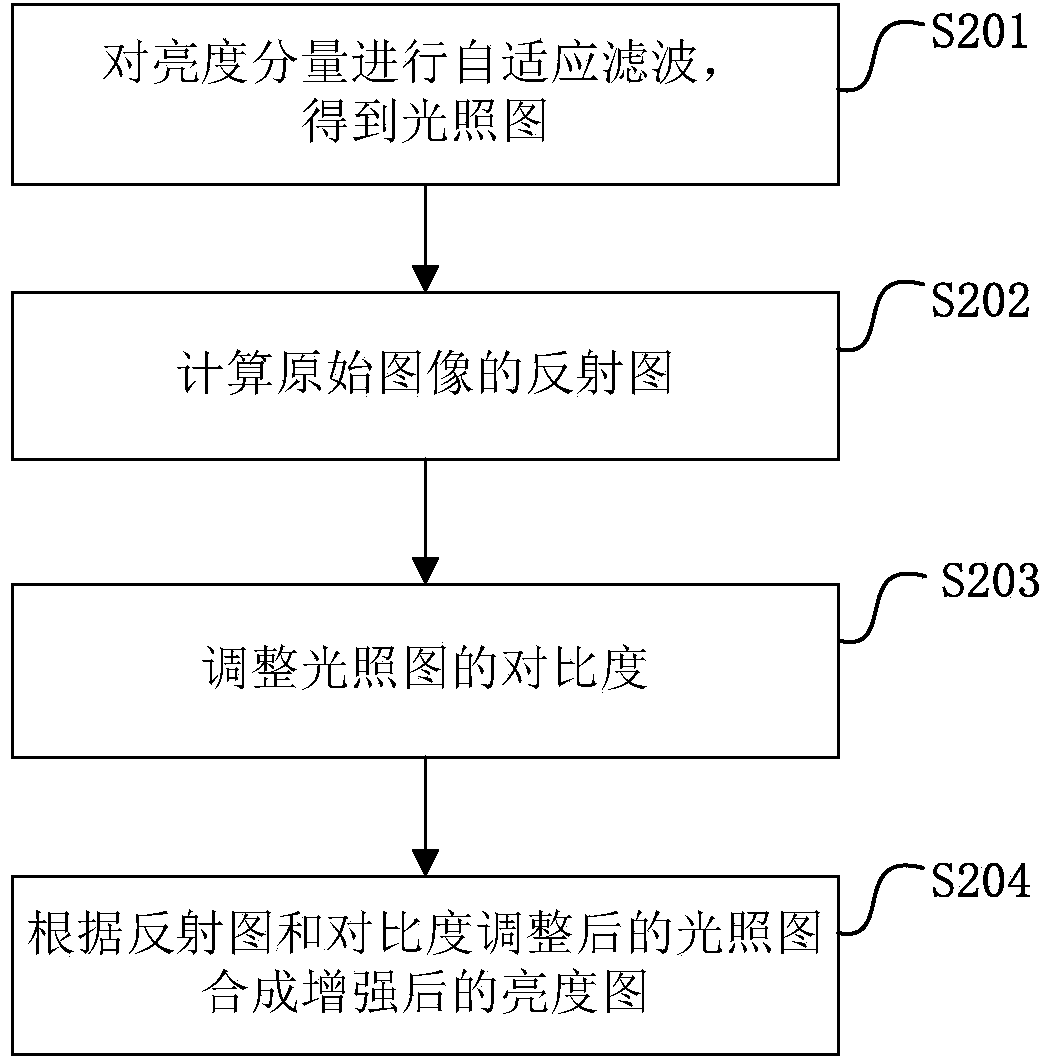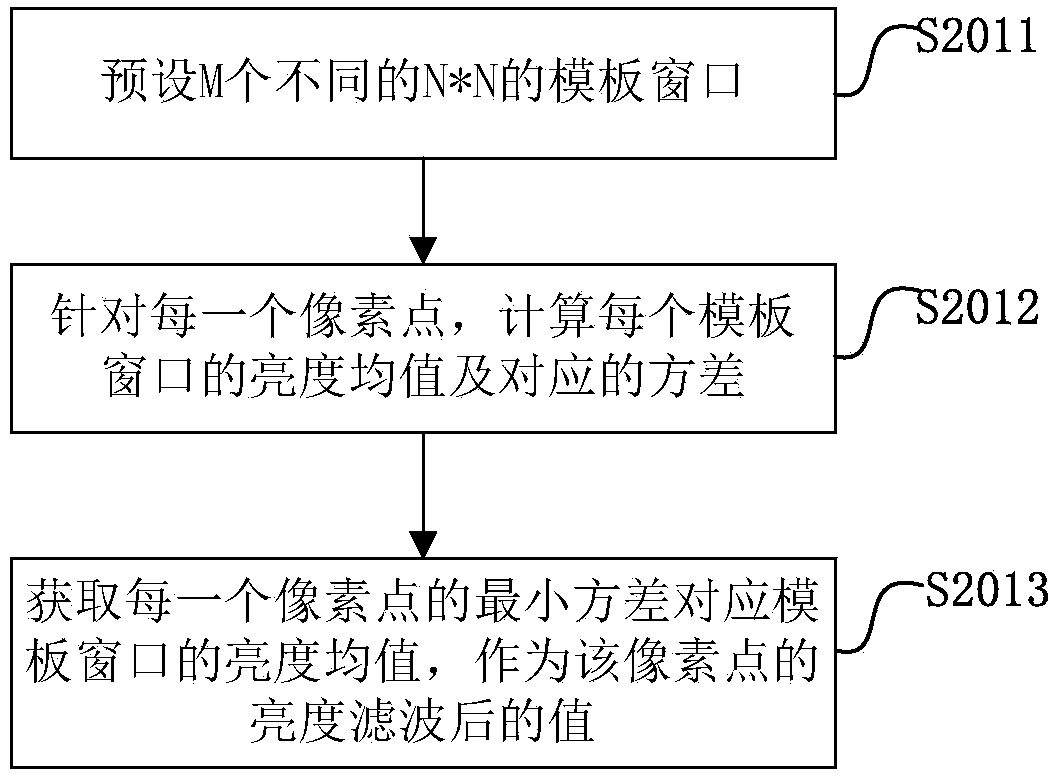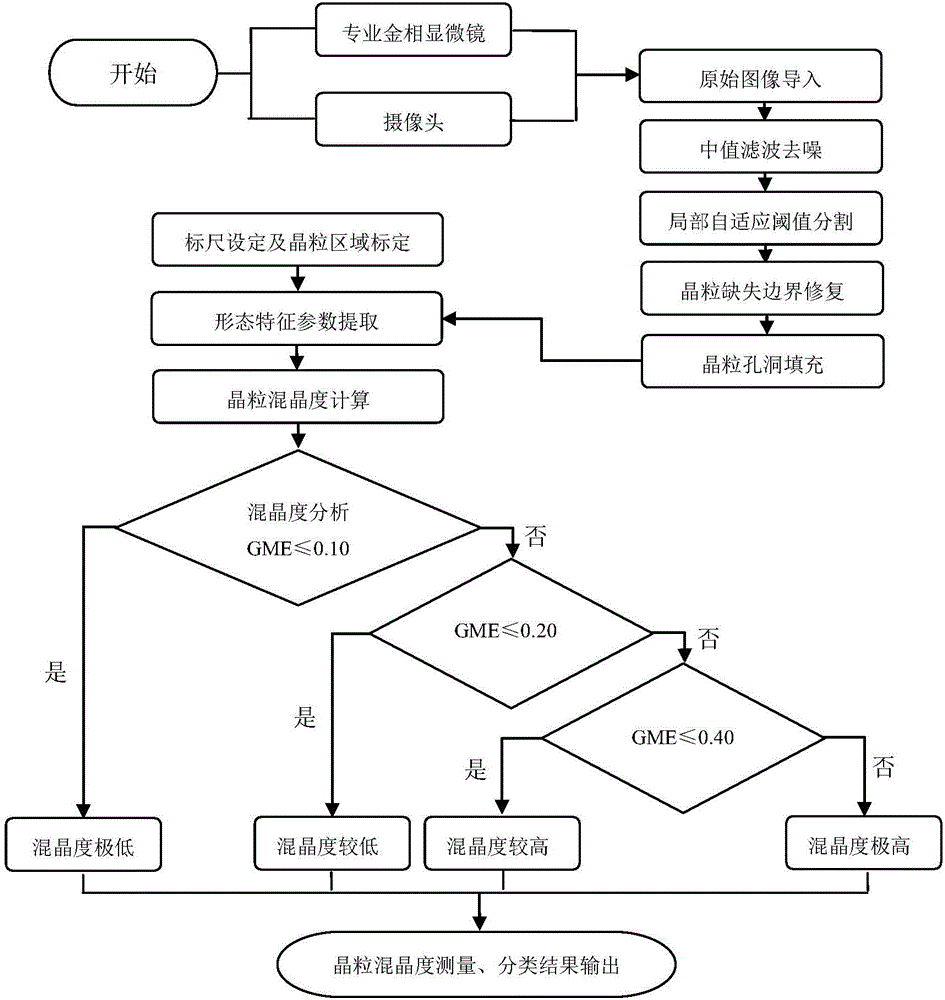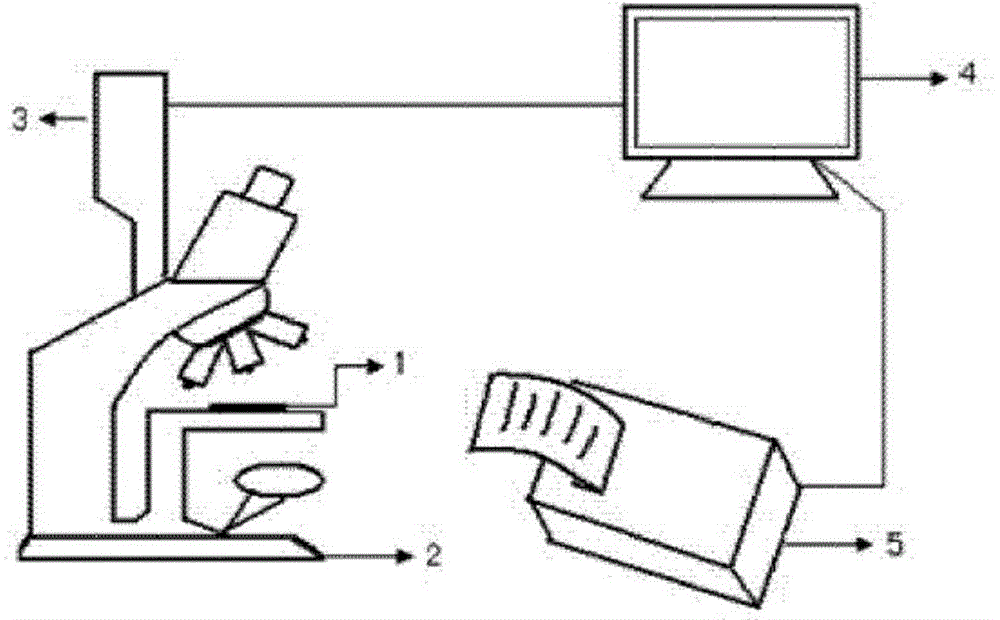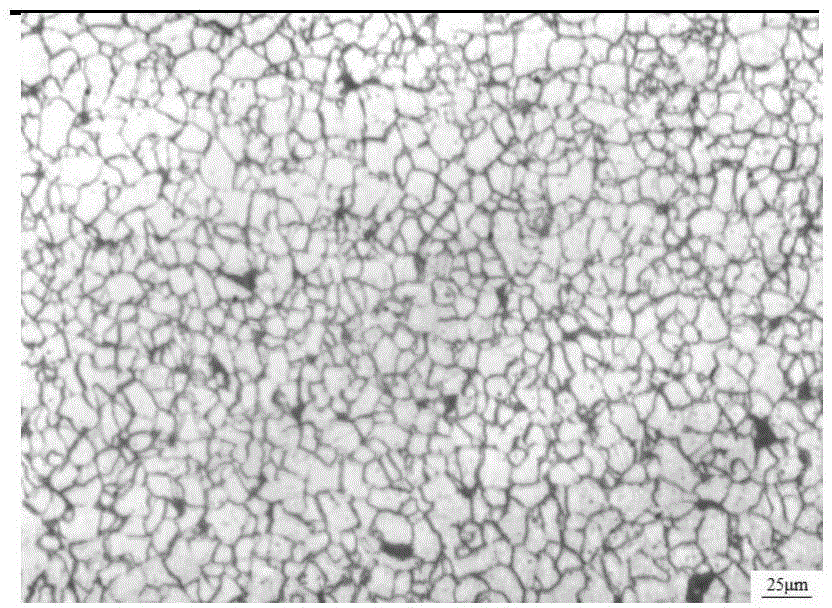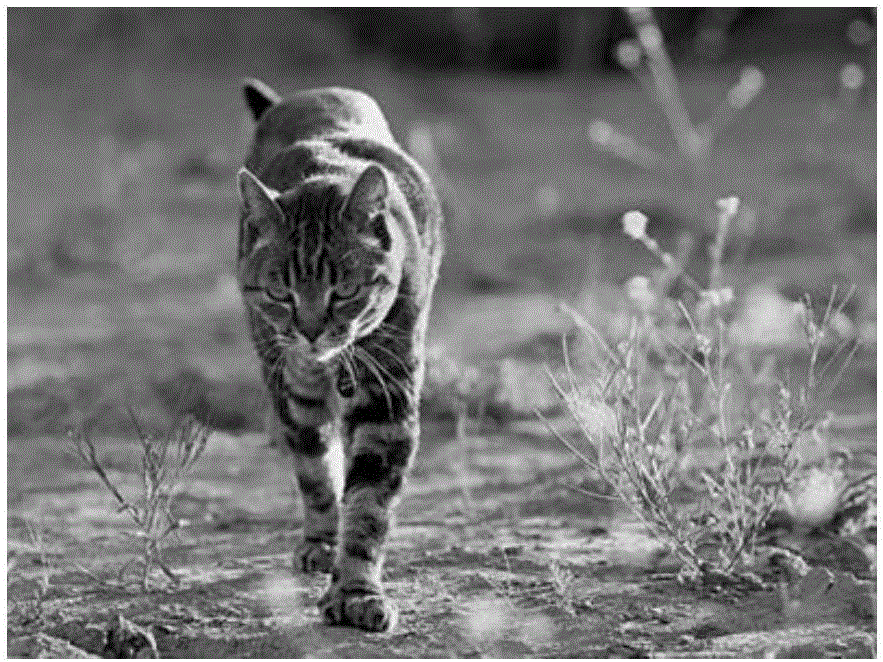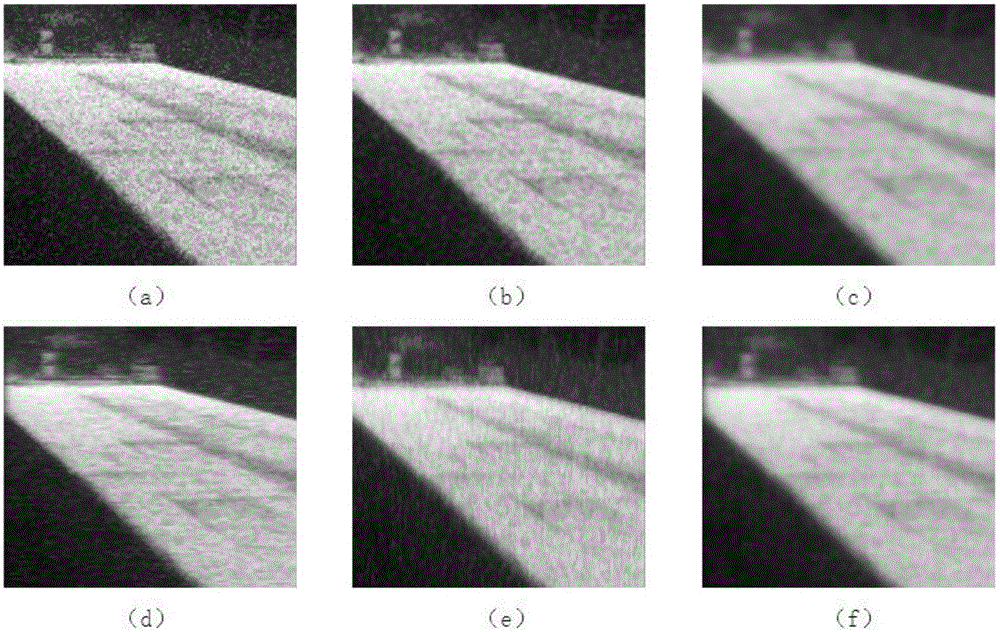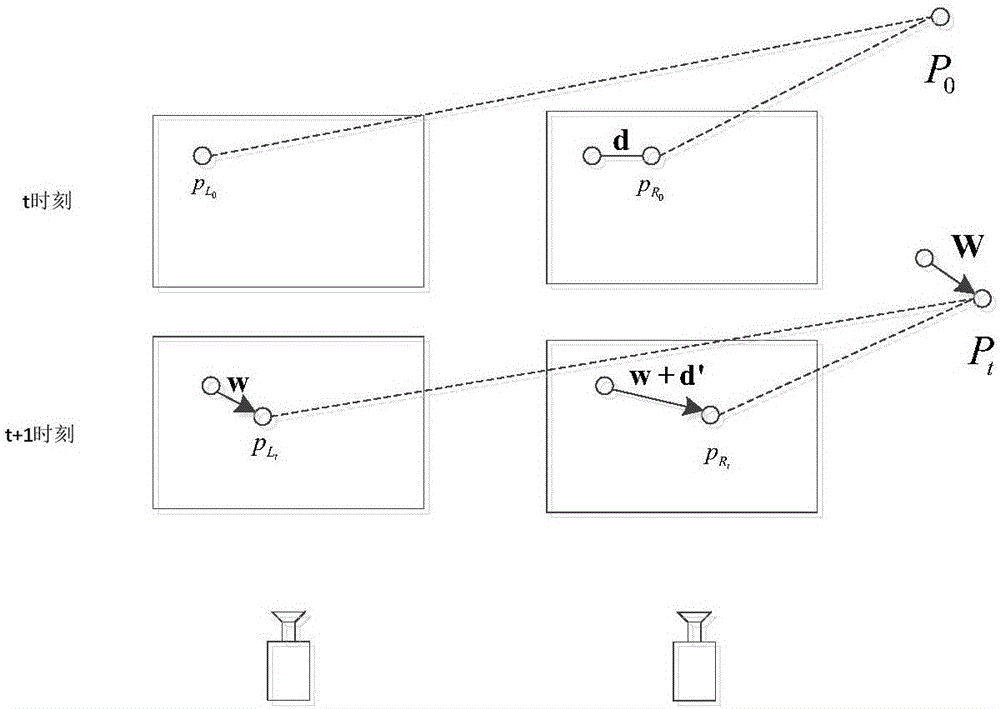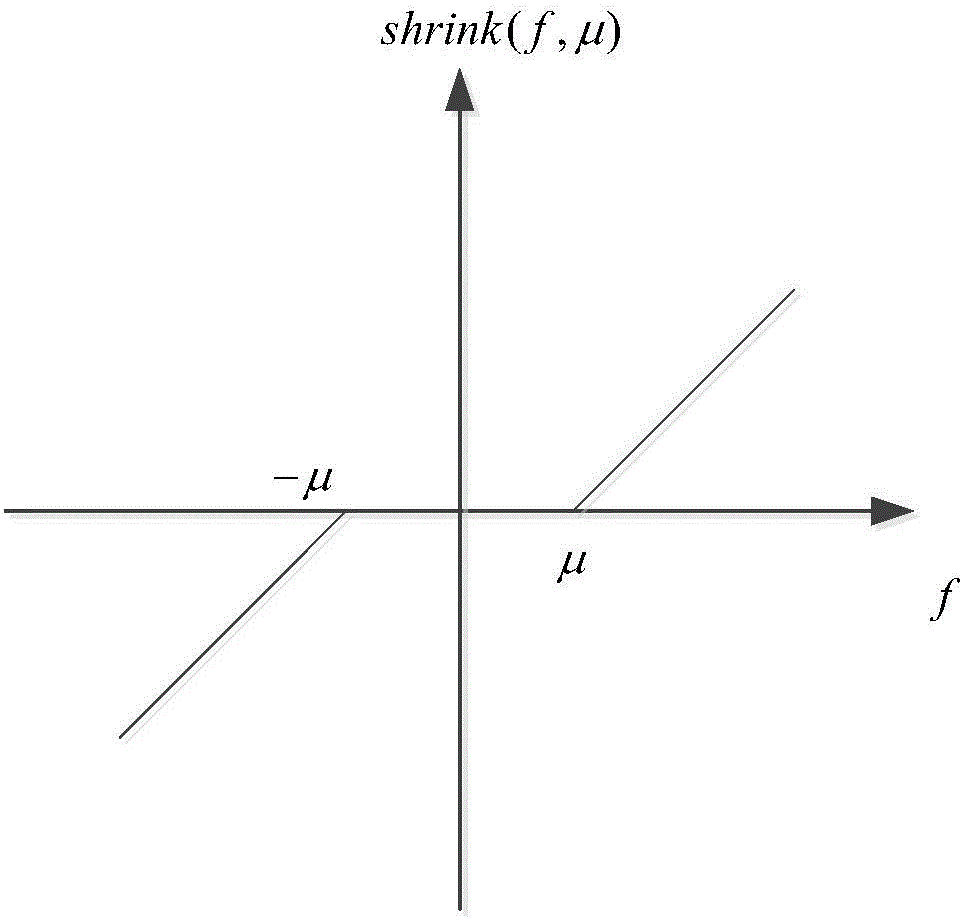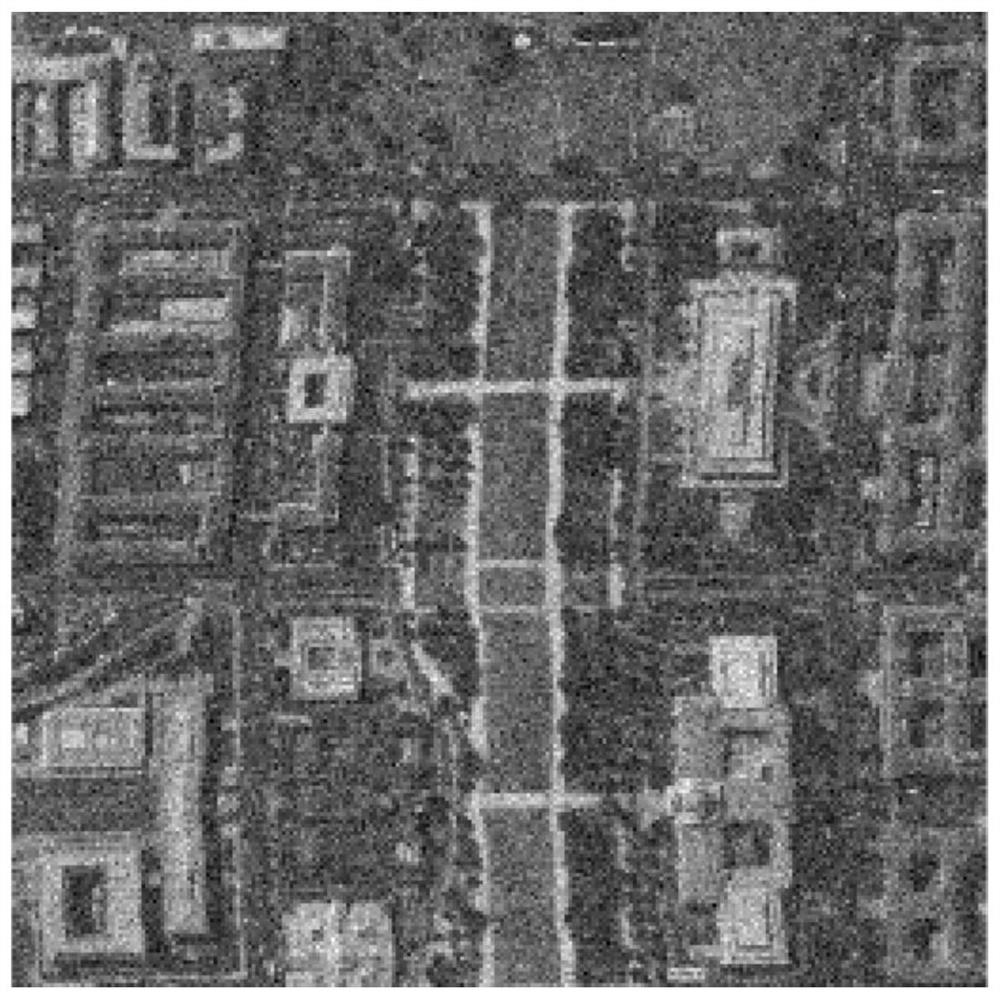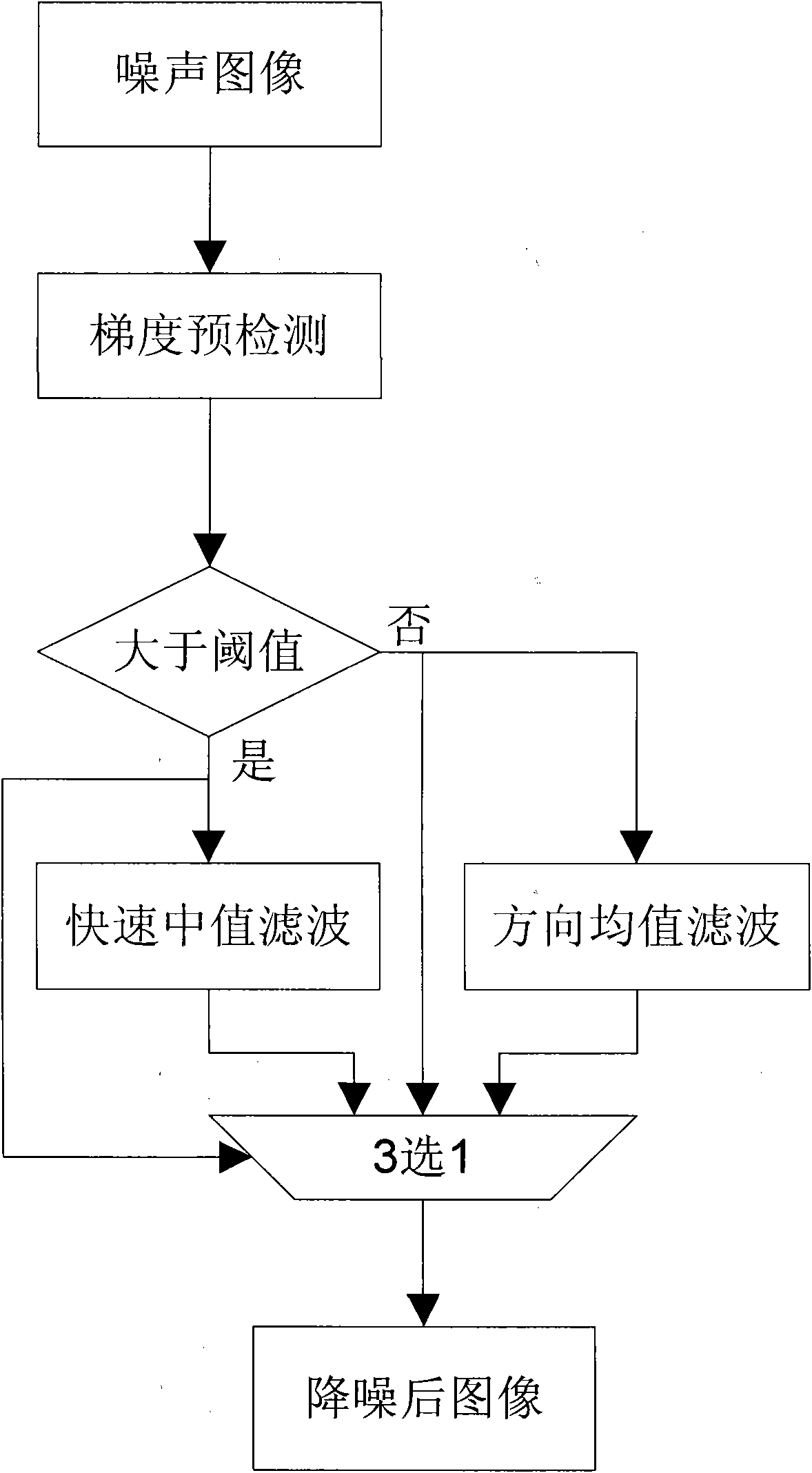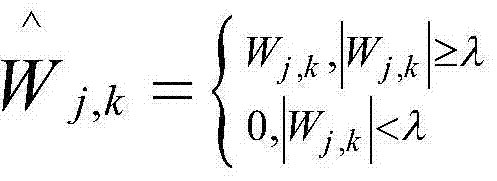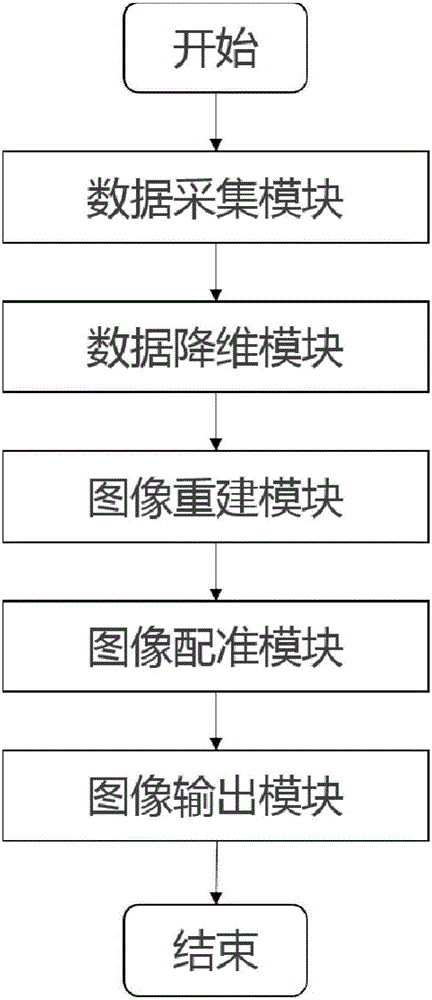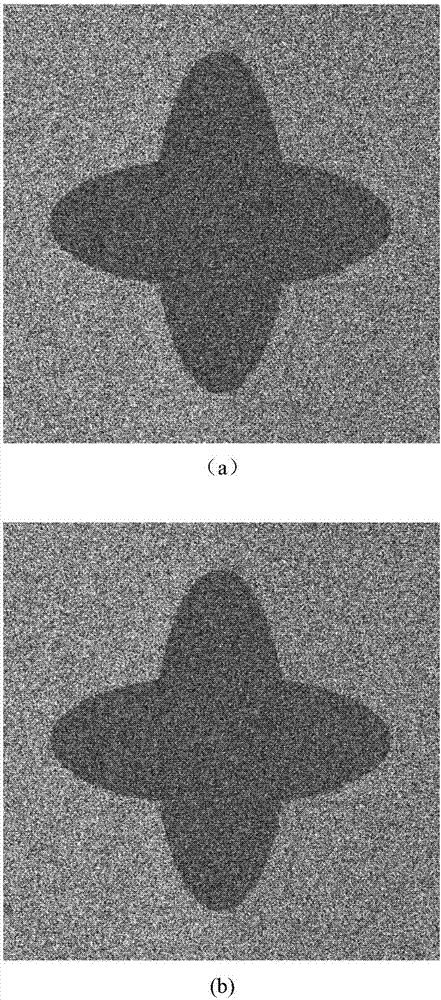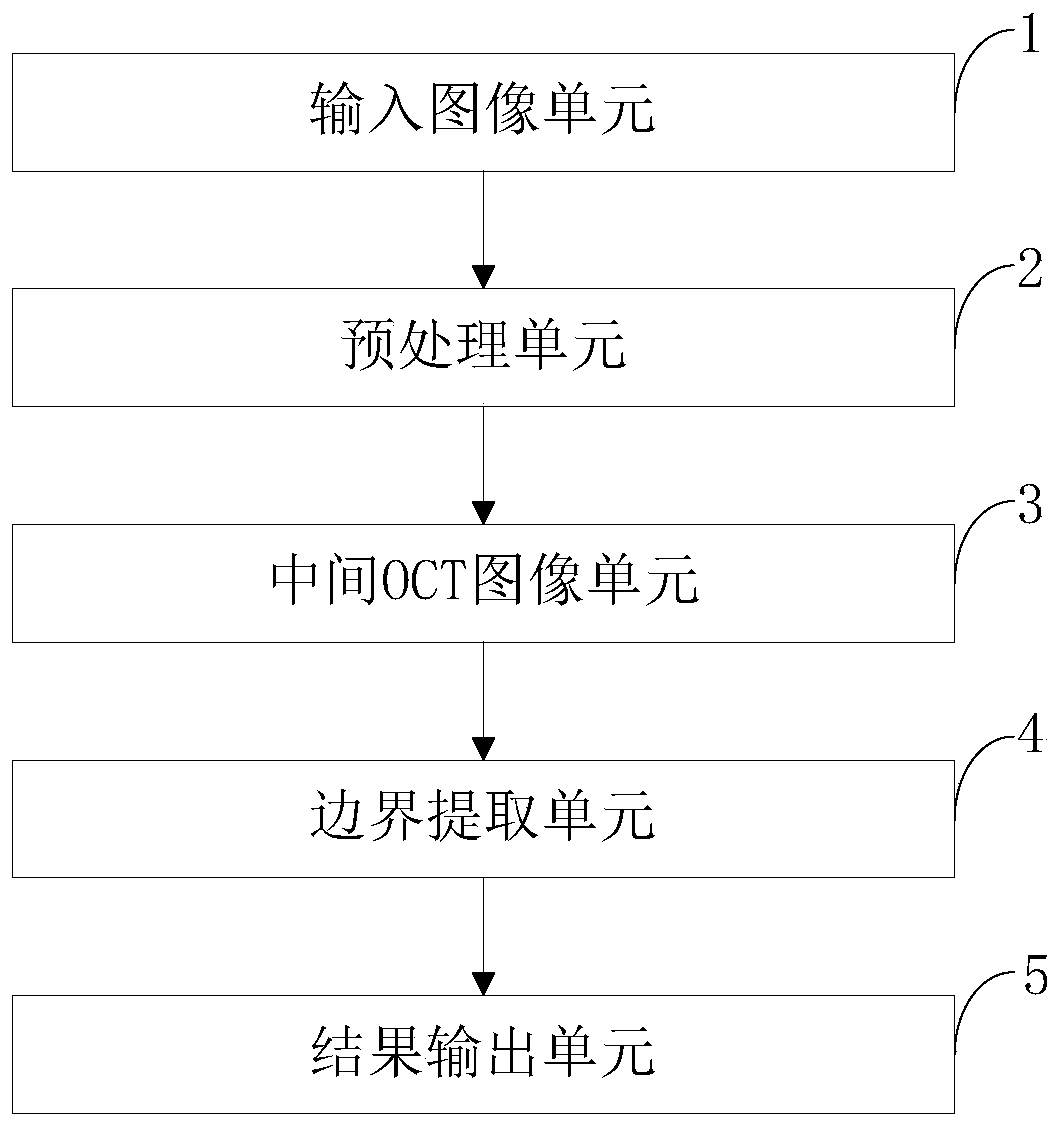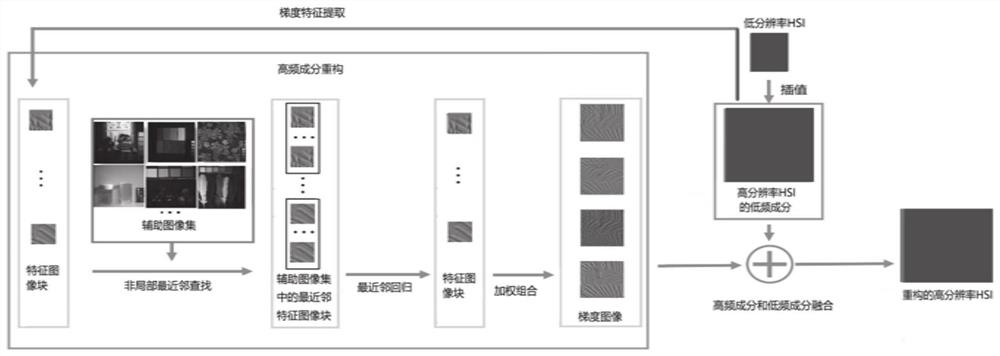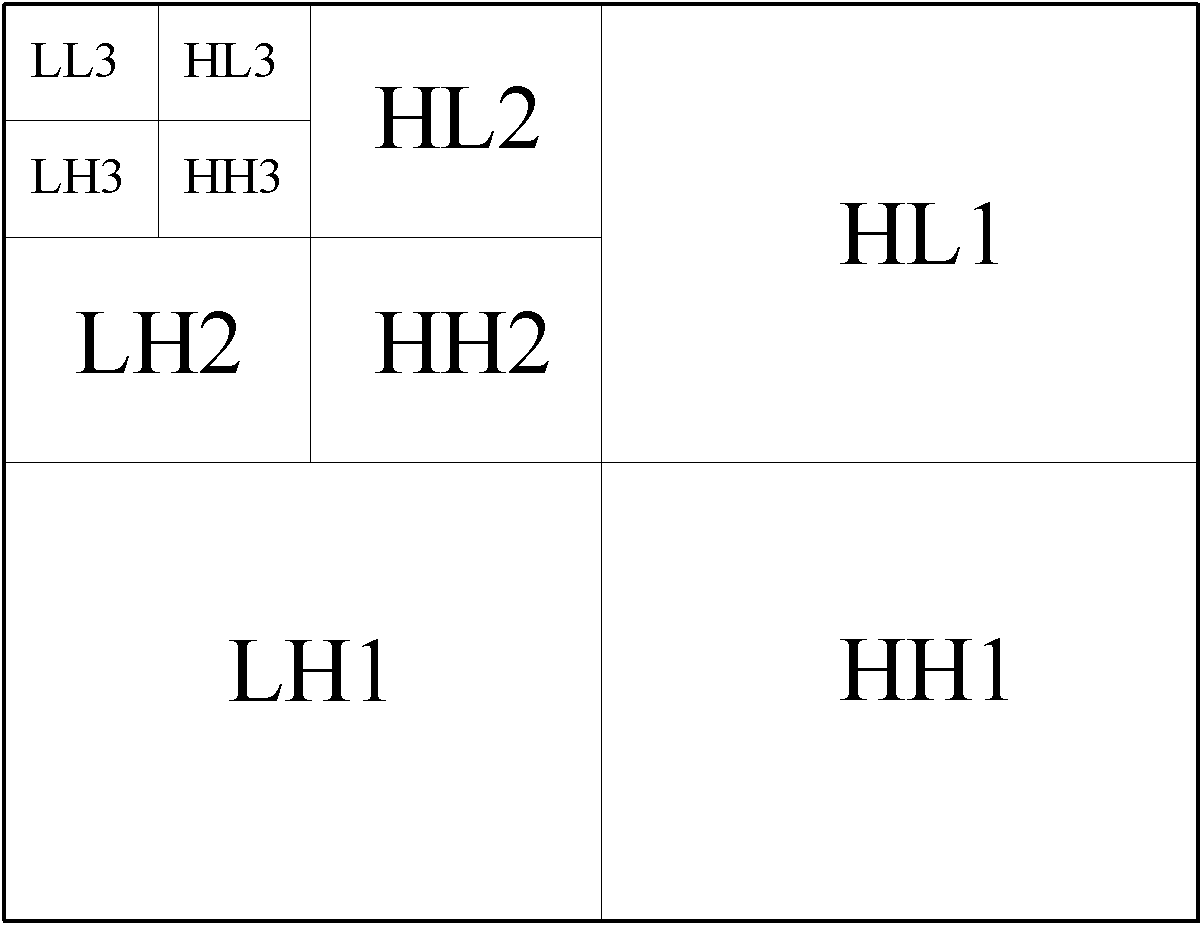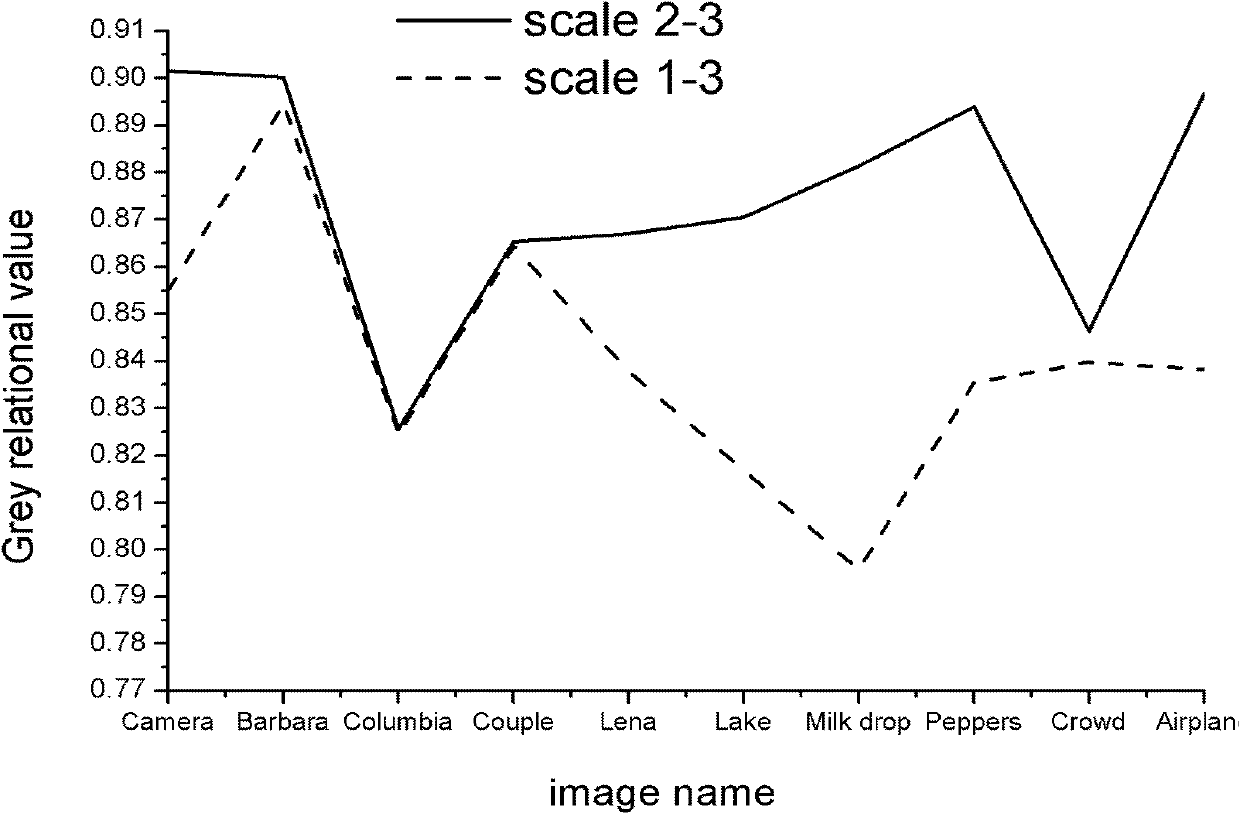Patents
Literature
Hiro is an intelligent assistant for R&D personnel, combined with Patent DNA, to facilitate innovative research.
51results about How to "Keep edge information" patented technology
Efficacy Topic
Property
Owner
Technical Advancement
Application Domain
Technology Topic
Technology Field Word
Patent Country/Region
Patent Type
Patent Status
Application Year
Inventor
Image super-resolution reconstruction algorithm based on shallow convolution neural network and deep convolution neural network
InactiveCN107240066AReconstruction is accurate and efficientPromote reconstructionGeometric image transformationNeural learning methodsFeature extractionSingle image
The invention discloses an image super-resolution reconstruction algorithm based on a shallow convolution neural network and a deep convolution neural network. The method comprises the following steps: 1) selecting a training sample and a testing sample; 2) performing extracting, mapping, upsamping and multi-scale conversion to the deep network characteristics; 3) extracting the characteristics of the shallow network; and 4) combining the shallow network and the deep network. Compared with the prior art, with regard to the single image reconstruction and video sequence reconstruction, the algorithm of the invention can accurately and effectively reconstruct the model of a high-resolution image so as to obtain a good reconstruction effect. In addition, multi-scale detail characteristic extraction is achieved, and the algorithm has better results than that of other existing algorithms. The reconstruction speed is also fast.
Owner:TIANJIN UNIV
Method and apparatus for eliminating noise
InactiveCN101308573ACancel noisePreserve image edge informationImage enhancementImage edgePattern recognition
The invention provides a method to eliminate noise, comprising the following steps: to compare a central pixel point and a neighborhood middle pixel point; to determine whether the central pixel point is a noise point based on the comparison result; if the central pixel point is a noise point, to replace the pixel value of the central pixel point with a weighted average of the pixel value of the neighborhood middle pixel point; if not, to replace the pixel value of the central pixel point with a weighted average between the pixel value of the neighborhood middle pixel point and the pixel value of the central pixel point. The method effectively eliminates the noise and well maintains the image edge information.
Owner:VIMICRO CORP
Kinect depth image inpainting method based on improved trilateral filtering
InactiveCN104809698AGood hole filling effectKeep edge informationImage enhancementColor imageRegion growing
The invention belongs to the technical field of depth image inpainting, and particularly relates to a Kinect depth image inpainting method based on improved trilateral filtering for kinect depth images. The method comprises the steps that depth images and color images are synchronously acquired by utilizing Kinect; the color images and the depth images are aligned; edge information of the depth images is extracted; edge information of the color images is extracted; non-boundary texture information in the color images is removed; pixel points of which the depth values are incorrect are found in the depth images by using a region growing method and the incorrect depth values of the points are removed; and filling inpainting is performed on the hole areas of the depth images by using the improved trilateral filtering method based on aberration and structural similarity coefficient. The method has great hole filling effect for the kinect depth images so that the edge information of the depth images can be greatly maintained.
Owner:HARBIN ENG UNIV
Low-illumination image enhancement method and system
The invention discloses a low-illumination image enhancement method and system, and belongs to the technical field of image processing. The method comprises the steps of converting an input original image into an HIS space from an RGB space, keeping the saturability and the hue component of the image unchanged, enhancing the brightness component, converting the image with the brightness enhanced into the RGB space from the HIS space and outputting the image. According to the low-illumination image enhancement method and system, the image brightness is improved, extremely-dark areas (the areas close to black) are prevented from being changed into bright-colored areas after being enhanced, and the image adapts to the human visual characteristics better. Meanwhile, the complexity is low, the calculation amount is small, high-definition images can be processed in real time, and the performance requirement for hardware can be lowered.
Owner:深圳百乐奇科技电子有限公司
Fundus image vascular segmentation method based on phase congruency
ActiveCN102982542AFilter noiseGood noise immunityImage analysisAdaptive histogram equalizationHistogram
The invention discloses a fundus image blood vessel segmentation method based on phase congruency and mainly overcomes the defect that a traditional method can not be used to accurately segment blood vessels in fundus images. The fundus image vascular segmentation method base on the phase congruency can be simultaneously used to segment small blood vessels of most tips. The method comprises the steps: (1) extracting green channels of the fundus images, (2) enhancing the contrast ratio of the images through contrast limited adaptive histogram equalization (CLAHE), (3) filtering the fundus images through the anisotropic coupled diffusion equation, (4) segmenting the blood vessels of the fundus images filtered or not filtered through the anisotropic coupled diffusion equation in a phase congruency algorithm, (5) multiplying pixel-levels of results of vessels, of two fundus images, segmented based on the phase congruency algorithm, (6) processing the images in a binaryzation mode through the iterative threshold segmentation method, (7) optimizing the images in the mathematical morphology method. The fundus image vascular segmentation method has significant application values in fields of three-dimensional splicing of the fundus images and judging existence of diabetes mellitus and severity of diabetes mellitus.
Owner:TIANJIN POLYTECHNIC UNIV
Mixed crystal degree automatic measurement and fine classification method for steel crystal grains, and system thereof
InactiveCN104880389AKeep edge informationEliminate mis-segmentationCharacter and pattern recognitionParticle size analysisCrystalliteMicroscopic scale
The invention belongs to the analysis field of quantitative metallography on all-form crystal grains in a steel material microstructure and particularly relates to an automatic measurement and fine classification method for steel crystal grains, and a system thereof. According to the method, an image acquisition device acquires the original images of to-be-measured crystal grains of the steel material firstly, and then the original images are pre-processed by an image pre-processing module. The pre-processed images are subjected to the region labeling treatment by an automatic measurement module, and then the images of to-be-measured crystal grains can be obtained. After that, the geometry characteristic parameters of the images of to-be-measured crystal grains are extracted, and then the characteristic morphological parameters of target crystal grains are measured through the random field area algorithm. The area of crystal grains is obtained, and then the grain size of crystal grains and the mixed crystal degree (GME) of crystal grains can be figured out. The mixed crystal degree (GME) of crystal grains is automatically classified by an automatic classification module according to a most suitable threshold. In this way, the blank in measuring and classifying the mixed crystal degree of steel crystal grains in the prior art can be filled up. Meanwhile, the characterization precision of the images of steel crystal grains is up to plus / minus 0.001 [mu]m. Therefore, by adopting the above method and the above system, the characterization precision of the images of steel crystal grains is highest during the steel metallographic structure analysis process.
Owner:JIANGSU UNIV
Textural feature and color feature fusion-based image saliency detection method
ActiveCN106780582AIncrease profitKeep edge informationImage enhancementImage analysisSaliency mapImage detection
The invention discloses a textural feature and color feature fusion-based image saliency detection method, and mainly aims at solving the problem that the textural feature utilization is insufficient and the high-texture image saliency detection result is relatively bad in the prior art. The scheme is that the method comprises the following steps of: 1) inputting an image and removing textures of the image by utilizing a total variation model-based filtering method so as to obtain an image with color textures; 2) filtering the input image by utilizing a Garbor filter so as to obtain an image with image texture information; 3) calculating a preliminary contrast value according to the image with the color features; 4) calculating a background probability according to the image with the texture information; and 5) fusing the preliminary contrast value and the background probability to obtain a new contrast and then obtaining a saliency map on the basis of color and texture features. According to the method disclosed by the invention, the color and texture information of the image is sufficiently utilized, so that the complicated-texture image detection effect is improved; and the method can be applied to computer vision tasks.
Owner:XIDIAN UNIV
Weighted synthetic kernel and triple markov field (TMF) based polarimetric synthetic aperture radar (SAR) image classification method
InactiveCN103955709AHigh precisionAccurate descriptionCharacter and pattern recognitionSupport vector machineMarkov field
The invention discloses a weighted synthetic kernel and TMF based polarimetric SAR image classification method and relates to polarimetric SAR image classification. The method comprises the steps of step 1, selecting polarimetric SAR image polarization characteristics and training samples, and building characteristic space; step 2, establishing the weighted synthetic kernel; step 3, achieving initial classification by the combination of the weighted synthetic kernel and a support vector machine to be used as an initial value of a marking field X; step 4, estimating a novel marking field X and a novel auxiliary field U; step 5, using the marking field X as the final polarimetric SAR image classification result till the marking field X converges. According to the method, the problems that the initial classification accuracy is not high, and the Markove field cannot process polarimetric SAR image unsteady characteristics of the prior method are mainly solved. Homogeneous region classification results are smooth, marginal information can be kept well, the classification accuracy is improved apparently, and the method can be used for target detection and recognition of polarimetric SAR images.
Owner:XIDIAN UNIV
Bidirectional iteration bilateral filtering method for asphalt images obtained through UAV-borne infrared imaging device
ActiveCN105069757AImprove filtering effectGood edge holdImage enhancementImage analysisLab color spaceImage conversion
The invention discloses a bidirectional iteration bilateral filtering method for asphalt images obtained through an UAV-borne infrared imaging device. The method includes a first step of taking original infrared asphalt images by utilizing an unmanned aerial vehicle (UAV), a second step of switching original infrared asphalt images in RGB color space to a Lab color space, a third step of expanding the image boundaries by using the boundary pixels of the infrared asphalt images in the Lab color space obtained in the second step, a forth step of conducting lateral filtering on the images obtained in the third step, a fifth step of conducting vertical filtering on the images obtained in the fourth step, and a sixth step of switching images in the Lab color space processed in the step 5 to the RGB color space and outputting filtered infrared asphalt images. Lateral and vertical bi-directional iteration bilateral filtering means is employed, infrared asphalt image noises can be rapidly eliminated, and the edge detail can be retained. The infrared asphalt image filtering effect is satisfactory, and edge information of images can be retained.
Owner:西安汇智信息科技有限公司
Scene motion blurred image restoration method in presence of moving object
InactiveCN102156965APromote recoveryKeep edge informationImage enhancementRestoration methodFilter methods
The invention belongs to the field of digital image processing, and in particular discloses a scene motion blurred image restoration method in the presence of a moving object. The method comprises the following steps of: 1, estimating and amending parameters of a motion model of a scene motion blurred image and extracting a moving object blurred image; 2, restoring the motion blurred image: including restoring the scene motion blurred image and restoring the moving object blurred image, wherein the parameters of the motion model of static scene motion blur are estimated by the method in the step 1 and are amended and then the image is restored by using an image restoration method for the scene motion burred image; and 3, fusing restored images: embedding the moving object image restored by the step 2 into the restored scene image, namely fusing the restored moving object image and the restored scene image, and processing the joint part of the restored moving object image and the restored scene image by using a filtering method to enable a joint of the images to be smooth so as to keep integrity of the image.
Owner:BEIJING INSTITUTE OF TECHNOLOGYGY
Hyperspectral image denoising method based on non-convex low-rank matrix approximation and total variation regularization
PendingCN112069919AAchieve sparse approximationImprove spatial segmentation smoothnessImage enhancementScene recognitionPattern recognitionImage denoising
The invention discloses a hyperspectral image denoising method based on non-convex low-rank matrix approximation and total variation regularization. The hyperspectral image denoising method comprisesthe following steps: 1) acquiring hyperspectral image data to be denoised, wherein M, N and K represent the number of width and height spectral bands of a hyperspectral image respectively; 2) constructing a denoising model based on non-convex low-rank matrix decomposition and TV regularization; (3) optimizing the model by adopting an Augmented Lagrange function (ALM) algorithm, and optimizing themodel by adopting an ALM algorithm; 4) optimizing and solving the model by adopting an augmented Lagrange function algorithm; and 5) outputting the hyperspectral image after the mixed noise is removed.
Owner:ZHEJIANG UNIV OF TECH
3D scene flow estimation method based on self-adaptive non-local smoothing method
ActiveCN106504202AKeep edge informationEfficient deliveryImage enhancementImage analysisMotion fieldSelf adaptive
The invention belongs to the field of machine vision, and particularly relates to a 3D scene flow estimation method based on the self-adaptive non-local smoothing method. The method comprises the steps of according to the corresponding relation between stereoscopic image sequences acquired by a binocular camera, combining the local constraint method with the global smoothing method and introducing the self-adaptive non-local smoothing method; in reference to a Lucas model, designing scene flow data items for the local neighborhood constrains; adopting the robust function as a smooth item to construct a total variation smoothing approximate to an L1 norm; and solving out an energy function in the de-antithesis manner. According to the technical scheme of the invention, noise-induced heterogeneous points in an image sequence can be effectively removed, and the edge information of the motion field can be maintained. Meanwhile, the information can be effectively transmitted to a low-texture region.
Owner:HARBIN ENG UNIV
Hyperspectral image denoising method based on multichannel truncated nuclear norm and total variation regularization
PendingCN112084847AKeep edge info goodImprove denoising effectImage enhancementScene recognitionAdditive white Gaussian noiseImage denoising
A hyperspectral image denoising method based on multichannel truncated nuclear norm and total variation regularization comprises the following steps: 1) obtaining a hyperspectral data image to be denoised, N being additive white Gaussian noise (AWGN), X being a recovered clean image, m and n being the length and width of the spatial dimension of the hyperspectral image respectively, and p being the number of spectral bands; 2) constructing a multi-channel truncated nuclear norm and total variation regularization hyperspectral image denoising model; (3) optimizing the model by adopting Alternating Direction Method of Multipliers (ADMM); and 4) outputting the denoised hyperspectral image. The method has the advantages that the piecewise smooth prior is better reserved, the edge information is effectively kept, and the denoising effect of Gaussian noise is enhanced at the same time.
Owner:ZHEJIANG UNIV OF TECH
High-efficient image denoising algorithm and hardware realization apparatus of algorithm
InactiveCN102170519AFast median filterKeep edge informationTelevision system detailsColor television detailsPattern recognitionDenoising algorithm
The present invention discloses a high-efficient image denoising algorithm and a hardware realization apparatus of the algorithm. The technical scheme comprises the steps of carrying out a gradient pre-detection of a central point of a (3*3) matrix, determining whether the noise is salt-and-pepper noise by the gradient, carrying out fast median filtering if the noise is the salt-and-pepper noise and carrying out orientation average filtering to filter Gauss noise if the noise is not the salt-and-pepper noise, and directly outputting non-noise points. The technical scheme can obtain an effect exceeding the effect of only carrying out median filtering or only carrying out average filtering under the hardware realization cost of being in need of only four rows of row cache, and has a better retentivity of image edges, and has flexible selectivity in filtering mode.
Owner:SHANGHAI INFOTM MICROELECTRONICS
SAR (synthetic aperture radar) image coherent speckle suppression method
ActiveCN106971382AImprove radiometric resolutionKeep edge informationImage enhancementImage analysisSparse constraintNormal density
The present invention provides an SAR (synthetic aperture radar) image coherent speckle suppression method. According to the method, the probability density function of multiplicative noises and prior information are utilized to construct the approximation term, diffusion term and sparse constraint of a model; a sparse partial differential equation model is established; and alternate optimization is adopted to obtain a solution, so that a coherent speckle-suppressed SAR image can be obtained. With the sparse partial differential equation-based SAR image coherent speckle suppression method of the invention adopted, the defects of a traditional filtering method and a partial differential equation method can be eliminated; and the coherent speckles of the image can be suppressed, the radiation resolution of the SAR image can be improved, and at the same time, the edge information and scattering characteristics of a radar target can be well retained, the quality improvement of the SAR image can be realized effectively, the numerical solution of the model can be obtained robustly, and therefore, the method is easy to implement.
Owner:NAT UNIV OF DEFENSE TECH
Blind element compensation method for infrared or terahertz image
An embodiment of the invention discloses a blind element compensation method for an infrared or terahertz image. The blind element compensation method comprises the steps of selecting X normal row image elements in a row on which the blind element is arranged; constructing a Newton interpolation function according to the X normal row image elements and calculating a row interpolation value of the blind element; selecting X normal line image elements from a line on which the blind element is arranged; constructing a Newton interpolation function according to the X normal line image elements and calculating a line interpolation value of the blind element; and calculating the gray level of the blind element according to the row interpolation value and the line interpolation value. The gray level which is compensated according to the blind element compensation method provided by the embodiment of the invention further approaches a real value and has a smaller error. Furthermore the blind element compensation method can better keep the edge information and the detail information of a target image and furthermore has higher image quality.
Owner:UNIV OF ELECTRONICS SCI & TECH OF CHINA
Real-time monitoring video adaptive filtering method and real-time monitoring video adaptive filtering system
ActiveCN104754183ASmall amount of calculationKeep edge informationTelevision system detailsColor television detailsAdaptive filterBlock match
The invention provides a real-time monitoring video adaptive filtering method and a real-time monitoring video adaptive filtering system. The real-time monitoring video adaptive filtering method comprises the following steps of performing block matching on a current video image f (x, y); constructing three-dimensional data groups of various similar blocks; performing wavelet transformation on the three-dimensional data groups; and respectively performing adaptive de-noising processing on a high-frequency coefficient and a low-frequency coefficient by using a soft and hard threshold value on the basis of noise variance iteration to obtain a de-noised image f1 (x, y). Video signals are recovered and processed, and influences of complex interference such as gauss and pulse noises are overcome; and marginal information of video images can be maintained, and the de-noising effect is high.
Owner:SICHUAN UNIVERSITY OF SCIENCE AND ENGINEERING
Belly image reconstruction device
InactiveCN106228583AAvoid the disadvantages of short breath holding timeEfficient and stable extractionReconstruction from projectionStudy methodsFree breathing
The present invention provides a belly image reconstruction device. The device is reconstructed in the free breathing, a Golden-Angle Radial 3D rapid scanning sequence is employed to obtain a liver image. The locally linear embedding (LLE) in the manifold learning method is employed to perform the dimension reduction process of the K space center data, and a respiratory curve is obtained; the data packet is performed according to the respiratory curve, and each group of data is subjected to reconstruction through adoption of a multi-scale low-order recovery theory; and finally, each group of reconstructed data is subjected to registering so as to eliminate the motion artifact and obtain a final image. The belly image reconstruction device does not reject any data with no need for an operator's manual participation, and is high in degree of automation and low in application cost, etc.
Owner:PEKING UNIV
SAR (Synthetic aperture radar) image super pixel segmentation method based on Gamma filtering
InactiveCN106934805AReduce the impact of processingImprove accuracyImage enhancementImage analysisPattern recognitionSynthetic aperture radar
The invention provides a SAR (Synthetic aperture radar) image super pixel segmentation method based on Gamma filtering, so as to solve the technical problem of low super pixel segmentation result accuracy existing in the present filtering-based super pixel segmentation method. The method comprises realization steps: mean filtering is adopted to filter an inputted original SAR image, and the mean value and the standard deviation of pixel grays are obtained; the variance coefficient of the pixel gray mean value, the variance coefficient of speckle noise and the variation coefficient of the SAR image are calculated respectively; the relationship among the coefficients is judged, and whether to carry out Gamma filtering is determined; the Gamma filtering method is adopted to carry out speckle noise reduct5ion on the inputted original SAR image; and super pixel segmentation is carried out on the SAR image after noise reduction, and multiple super pixel blocks are obtained and outputted. Influences of speckle noise in the SAR image can be reduced, the SAR image super pixel segmentation accuracy is improved, and the method can be used for target detection, recognition and classification on the SAR image.
Owner:XIDIAN UNIV
Ultrasonic image noise reduction method and electronic equipment
PendingCN114648456AAvoid problems with suboptimal suppressionAvoid destructionImage enhancementImage analysisGradient operatorsImaging quality
The invention relates to the technical field of ultrasound, in particular to an ultrasonic image noise reduction method and electronic equipment, and is used for solving the problem of how to well suppress speckle noise and well maintain edge information during image filtering. According to the invention, only the image in the window is filtered by setting the filtering window. And if the image quality in the window is greater than the image quality threshold, it is proved that the image quality is relatively high, and at the moment, the Lee filtering algorithm is adopted for filtering, so that the edge information of the image can be ensured while the speckle noise is suppressed. If the image quality in the window is smaller than or equal to the image quality threshold value and the size of the filtering window is smaller than the window minimum value, it is proved that the image quality is low, at the moment, a gradient operator is adopted for filtering, the problem that the speckle noise suppression effect is not ideal is avoided, and edge information is prevented from being damaged.
Owner:QINGDAO HISENSE MEDICAL EQUIP
A low-light image enhancement method and system
The invention discloses a low-illumination image enhancement method and system, and belongs to the technical field of image processing. The method comprises the steps of converting an input original image into an HIS space from an RGB space, keeping the saturability and the hue component of the image unchanged, enhancing the brightness component, converting the image with the brightness enhanced into the RGB space from the HIS space and outputting the image. According to the low-illumination image enhancement method and system, the image brightness is improved, extremely-dark areas (the areas close to black) are prevented from being changed into bright-colored areas after being enhanced, and the image adapts to the human visual characteristics better. Meanwhile, the complexity is low, the calculation amount is small, high-definition images can be processed in real time, and the performance requirement for hardware can be lowered.
Owner:深圳市百乐奇科技有限公司
Automatic SAR image segmentation method based on graph division particle swarm optimization
ActiveCN107220985AKeep edge informationRealize automatic segmentationImage enhancementImage analysisImage segmentationEnergy functional
The invention discloses an automatic SAR image segmentation method based on graph division particle swarm optimization and mainly solves a problem of poor image segmentation effect in the prior art. The method comprises steps that 1, an original to-be-segmented image is inputted, and the gray information is read; 2, the to-be-segmented image is filtered to acquire a gradient image; 3, the gradient image is divided into non-overlapped regions; 4, the largest class quantity of the gradient image is solved and is taken as the largest image gray level; 5, the segmented regions are mapped to be undirected weighted graphs, and an energy function of the undirected weighted graphs is constructed; 6, iteration solution of the energy function is carried out to acquire a class center and the class quantity; and 7, whether iteration frequency is smaller than 20 is determined, if yes, particle update continues, if not, the optimal class quantity and the images after segmentation are outputted. The method is advantaged in that the operation speed is fast, the segmentation effect is good, and the method can be applied to medical images, satellite image positioning, face identification, fingerprint identification, traffic control systems and machine vision.
Owner:XIDIAN UNIV
OCT image edema region boundary extraction method and system based on biological inspiration
InactiveCN110298848AIncrease contrastSolve the noiseImage enhancementImage analysisPattern recognitionPressure function
The invention belongs to the technical field of edema region boundary extraction, and discloses an OCT image edema region boundary extraction method and system based on biological inspiration, and themethod comprises the steps: carrying out the denoising and smooth preprocessing of an OCT image based on biological inspiration; and carrying out edema region boundary extraction on the OCT image byutilizing the improved SBGFRLS model. According to the method, denoising and smoothing preprocessing of the OCT image are realized based on a structure preserving and guiding retina image filtering method; according to the SGRIF method, the image quality is improved, meanwhile, the structure of the retina image is protected, and a foundation is laid for high-precision extraction of the edema region boundary; based on edema region boundary extraction of the improved level set, the level set evolution curve is converged into the edema region by improving the symbolic pressure function in the binarized Gaussian filtering level set, and high-precision extraction of the edema region boundary of the DME is achieved.
Owner:南京医科大学眼科医院
Method for extracting container loading bridge based on remote sensing interpretation analysis technology
ActiveCN108257143AImprove efficiencyImprove accuracyImage enhancementImage analysisGradationDatafication
The invention discloses a method for extracting a container loading bridge based on a remote sensing interpretation analysis technology. The method comprises the steps of: firstly, constructing a background model by using LBP texture gray scale invariance; secondly, dividing an image into a plurality of non-overlapping regions according to different characteristics on an initial target model; thirdly, performing topologization and extraction on a remote sensing image, and conducting normalization processing to obtain a shape template; and finally, performing compensation on the shape templateaccording to texture characteristics to identify the container loading bridge. The method is based on fuzzy selection and carries out digitization at the same time, edge information can be maintainedduring the digitization process, the subsequent processing is facilitated, the remote sensing image is divided into the plurality of parts through image segmentation in the processing process, the remote sensing image can be coordinated through normalization processing after compensation of the shape template and the texture characteristics, tremendous amount of computing can be avoided, and the data processing efficiency and identification accuracy rate can be improved.
Owner:TRANSPORT PLANNING & RES INST MINIST OF TRANSPORT
Method and apparatus for eliminating noise
InactiveCN101308573BCancel noisePreserve image edge informationImage enhancementComputer visionImage edge
The invention provides a method to eliminate noise, comprising the following steps: comparing a central pixel point and a neighborhood middle pixel point; determining whether the central pixel point is a noise point based on the comparison result; if the central pixel point is a noise point, replacing the pixel value of the central pixel point with a weighted average of the pixel value of the neighborhood middle pixel point; if not, replacing the pixel value of the central pixel point with a weighted average between the pixel value of the neighborhood middle pixel point and the pixel value ofthe central pixel point. The method effectively eliminates the noise and well maintains the image edge information.
Owner:VIMICRO CORP
Human body animation synthesis method based on human body soft tissue grid model
PendingCN111968208AImprove the effectOvercoming post-processing workAnimationNuclear medicineImage extraction
The invention discloses a human body animation synthesis method based on a human body soft tissue grid model, and the method comprises the steps: firstly extracting the features of different dimensions of an image through a feature pyramid network, and then inputting the features of different dimensions into subsequent tasks such as human body part segmentation, soft tissue texture and posture estimation through a region-feature alignment technology.; and according to the three-dimensional posture and the soft tissue texture, mapping the figure in the original image to a three-dimensional human body soft tissue grid model to achieve reconstruction of the human body soft tissue grid model, and then achieved human body animation synthesis through redirection of the human body soft tissue grid model. By using the method of combining the human body soft tissue mesh model and the deep learning, the human body soft tissue motion can be accurately captured, so that the synthesized human bodyanimation details are richer in expression.
Owner:GUANGDONG UNIV OF TECH
Edge information considering half-toning method and system of multi-level error diffusion image
InactiveCN108320271AConvenient statisticsKeep edge informationImage enhancementImage analysisDecompositionEdge structure
The invention discloses an edge information considering half-toning method and system of a multi-level error diffusion image, and belongs to the technical field of hard copying and output of digital images. The method comprises that an input image is decomposed nonlinearly, half-toning is carried out on each decomposition image in an edge information considering multi-dimensional error diffusion half-toning method, multiple binary half-toning images are obtained, and a multi-level half-toning image is obtained by merging the binary half-toning images. Via the method, the problem that an errordiffusion half-toning method tends to cause regular texture can be solved effectively, the hierarchy of the half-toning image is kept consistent with that of the input image, edge structure information of the input image can be maintained, and the multi-level half-toning image obtained by the method can be directly applied to a multi-bit printer for printing and outputting.
Owner:WUHAN UNIV
Edge-preserving hyperspectral image super-resolution reconstruction method and system
PendingCN113436077AKeep edge informationIncrease high resolutionImage enhancementImage analysisFeature extractionImage resolution
The invention discloses an edge-preserving hyperspectral image super-resolution reconstruction method and system. The method comprises the following steps of acquiring a to-be-processed low-resolution hyperspectral image; pre-processing the to-be-processed low-resolution hyperspectral image to obtain a low-frequency component of the hyperspectral image; performing gradient feature extraction on the low-frequency component of the hyperspectral image to obtain a plurality of feature image blocks; searching k closest feature image blocks from an auxiliary image set for each feature image block; performing weighted summation on the k closest feature image blocks to obtain the updated feature image blocks; weighting and combining the adjacent blocks in the updated feature image blocks together to obtain a high-frequency component of the hyperspectral image; and fusing the low-frequency component of the hyperspectral image and the high-frequency component of the hyperspectral image to obtain a reconstructed high-resolution hyperspectral image. By means of the auxiliary image set, the high-frequency information is reconstructed by adopting a neighborhood regression method, so that the edge information of the image is well maintained, and the precision of the reconstructed high-resolution hyperspectral image is improved.
Owner:SHANDONG UNIV
Real-time three-dimensional gesture tracking method based on geometric method
InactiveCN110263702ACancel noiseEliminate voidsImage enhancementImage analysisPrincipal component analysisComputer science
The invention discloses a real-time three-dimensional gesture tracking method based on a geometric method. By using a geometric method, a hand position, a palm center and fingertips are captured in real time through a depth sensor to carry out gesture tracking. The depth information is repaired and denoised by using the pixel filter, so that the accuracy of determining the position of the subsequent fingertip is improved. Through an object recognition method, a square frame with the minimum depth is selected as the position of a hand region of interest, the hand region of interest is predicted and corrected through nuclear correlation filtering, an arm region is removed through principal component analysis, and the accuracy of the whole system is improved. The expanded inscribed circle is used for removing the part belonging to the inscribed circle internal region, so that the search range determined by the fingertip point is reduced, and the efficiency of the whole system is improved. The geodesic distance is only applied to the outer area of the inscribed circle, the position of a fingertip point is more accurately and stably determined, and the real-time performance of the system is improved. The finger areas are marked differently, so that the interference of the subsequent fingertips on the preorder fingertips is eliminated.
Owner:NANJING UNIV OF POSTS & TELECOMM
Image denoising method based on gray relation threshold value
InactiveCN102184530AKeep edge informationImprove denoising effectImage enhancementImage denoisingImaging processing
The invention discloses an image denoising method based on a gray relation threshold value, and belongs to the field of image denoising in image processing. The method comprises the following steps of: performing three-dimensional wavelet decomposition on an input noise image, calculating a wavelet coefficient gray relation degree in each dimension and each direction on the basis of a gray relation principle, analyzing the calculated gray relation degrees to construct the gray relation threshold value of wavelet coefficients, screening the wavelet coefficients by using the gray relation threshold value and reconstructing so as to denoise the image. By the method, the image is denoised, and the edge information of the image is well maintained at the same time, so that the denoised image isbetter than that processed by the traditional method in vision.
Owner:NANJING UNIV OF AERONAUTICS & ASTRONAUTICS
Features
- R&D
- Intellectual Property
- Life Sciences
- Materials
- Tech Scout
Why Patsnap Eureka
- Unparalleled Data Quality
- Higher Quality Content
- 60% Fewer Hallucinations
Social media
Patsnap Eureka Blog
Learn More Browse by: Latest US Patents, China's latest patents, Technical Efficacy Thesaurus, Application Domain, Technology Topic, Popular Technical Reports.
© 2025 PatSnap. All rights reserved.Legal|Privacy policy|Modern Slavery Act Transparency Statement|Sitemap|About US| Contact US: help@patsnap.com
